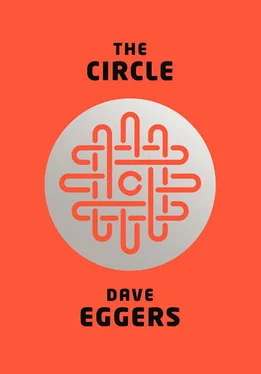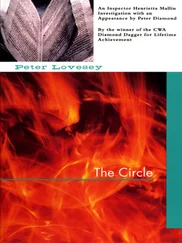Of the Three Wise Men, Bailey was the most likely to be seen on campus, to play Dixieland trombone in the company talent show, most likely to appear on talk shows representing the Circle, chuckling when talking about—when shrugging off—this or that FCC investigation, or when unveiling a helpful new feature or game-changing technology. He preferred to be called Uncle Eamon, and when he strode through campus, he did so as would a beloved uncle, accessible and genuine. “Like Bill Murray striding through Pebble Beach,” was how Stenton once described him. “Loved by all, and I think he really loves them back.” The three of them, in life and in this portrait, made for a strange bouquet of mismatched flowers, but there was no doubt that it worked. Everyone knew it worked, the three-headed model of management, and the dynamic was thereafter emulated elsewhere in the Fortune 500, with mixed results.
“But so why,” Mae asked, “couldn’t they afford a real portrait by someone who knows what they’re doing?”
The more she looked at it, the stranger it became. The artist had arranged it such that each of the Wise Men had placed a hand on another’s shoulder. It made no sense and defied the way arms could bend or stretch.
“Bailey thinks it’s hilarious,” Annie said. “He wanted it in the main hallway, but Stenton vetoed him. You know Bailey’s a collector and all that, right? He’s got incredible taste. I mean, he comes across as the good-time guy, as the everyman from Omaha, but he’s a connoisseur, too, and is pretty obsessed with preserving the past—even the bad art of the past. Wait till you see his library.”
They arrived at an enormous door, which seemed and likely was medieval, something that would have kept barbarians at bay. A pair of giant gargoyle knockers protruded at chest level, and Mae went for the easy gag.
“Nice knockers.”
Annie snorted, waved her hand over a blue pad on the wall, and the door opened.
Annie turned to her. “Holy fuck, right?”
It was a three-story library, three levels built around an open atrium, everything fashioned in wood and copper and silver, a symphony of muted color. There were easily ten thousand books, most of them bound in leather, arranged tidily on shelves gleaming with lacquer. Between the books stood stern busts of notable humans, Greeks and Romans, Jefferson and Joan of Arc and MLK. A model of the Spruce Goose —or was it the Enola Gay? —hung from the ceiling. There were a dozen or so antique globes lit from within, the light buttery and soft, warming various lost nations.
“He bought so much of this stuff when it was about to be auctioned off, or lost. That’s his crusade, you know. He goes to these distressed estates, these people who are about to have to sell their treasures at some terrible loss, and he pays market rates for all this, gives the original owners unlimited access to the stuff he’s bought. That’s who’s here a lot, these grey-hairs who come in to read or touch their stuff. Oh you have to see this . It’ll blow your head off.”
Annie led Mae up the three flights of stairs, all of them tiled with intricate mosaics—reproductions, Mae assumed, of something from the Byzantine era. She held the brass rail going up, noting the lack of fingerprints, of any blemish whatsoever. She saw accountants’ green reading lamps, telescopes crisscrossed and gleaming in copper and gold, pointing out the many beveled-glass windows—“Oh look up,” Annie told her, and she did, to find the ceiling was stained glass, a fevered rendering of countless angels arranged in rings. “That’s from some church in Rome.”
They arrived at the library’s top floor, and Annie led Mae through narrow corridors of round-spined books, some of them as tall as her—Bibles and atlases, illustrated histories of wars and upheavals, long-gone nations and peoples.
“All right. Check this out,” Annie said. “Wait. Before I show you this, you have to give me a verbal non-disclosure agreement, okay?”
“Fine.”
“Seriously.”
“I’m serious. I take this seriously.”
“Good. Now when I move this book…” Annie said, removing a large volume titled The Best Years of Our Lives . “Watch this,” she said, and backed up. Slowly, the wall, bearing a hundred books, began to move inward, revealing a secret chamber within. “That’s High Nerd, right?” Annie said, and they walked through. Inside, the room was round and lined with books, but the main focus was a hole in the middle of the floor, surrounded by a copper barrier; a pole extended down, through the floor and to unknown regions below.
“Does he fight fires?” Mae asked.
“Hell if I know,” Annie said.
“Where does it go?”
“As far as I can tell, it goes to Bailey’s parking space.”
Mae mustered no adjectives. “You ever go down?”
“Nah, even showing me this was a risk. He shouldn’t have. He told me that. And now I’m showing you, which is silly. But it shows you the kind of mind this guy has. He can have anything, and what he wants is a fireman’s pole that drops seven stories to the garage.”
The sound of a droplet emitted from Annie’s earpiece, and she said “Okay” to whomever was on the other end. It was time to go.
“So,” Annie said in the elevator—they were dropping back to the main staff floors—“I have to go and do some work. It’s plankton-inspection time.”
“It’s what time?” Mae asked.
“You know, little startups hoping the big whale—that’s us—will find them tasty enough to eat. Once a week we take a series of meetings with these guys, Ty-wannabes, and they try to convince us that we need to acquire them. It’s a little bit sad, given they don’t even pretend to have any revenue, or even potential for it, anymore. Listen, though, I’m going to hand you off to two company ambassadors. They’re both very serious about their jobs. Actually, beware of just how into their jobs they are. They’ll give you a tour of the rest of the campus, and I’ll pick you up for the solstice party afterward, okay? Starts at seven.”
The doors opened on the second floor, near the Glass Eatery, and Annie introduced her to Denise and Josiah, both in their late-middle-twenties, both with the same level-eyed sincerity, both wearing simple button-down shirts in tasteful colors. Each shook Mae’s hand in two of theirs, and almost seemed to bow.
“Make sure she doesn’t work today,” were Annie’s last words before she disappeared back into the elevator.
Josiah, a thin and heavily freckled man, turned his blue unblinking eyes to Mae. “We’re so glad to meet you.”
Denise, tall, slim, Asian-American, smiled at Mae and closed her eyes, as if savoring the moment. “Annie told us all about you two, how far back you go. Annie’s the heart and soul of this place, so we’re very lucky to have you here.”
“Everyone loves Annie,” Josiah added.
Their deference to Mae felt awkward. They were surely older than her, but they behaved as if she were a visiting eminence.
“So I know some of this might be redundant,” Josiah said, “but if it’s okay we’d like to give you the full newcomer tour. Would that be okay? We promise not to make it lame.”
Mae laughed, urged them on, and followed.
The rest of the day was a blur of glass rooms and brief, impossibly warm introductions. Everyone she met was busy, just short of overworked, but nevertheless thrilled to meet her, so happy she was there, any friend of Annie’s… There was a tour of the health center, and an introduction to the dreadlocked Dr. Hampton who ran it. There was a tour of the emergency clinic and the Scottish nurse who did the admitting. A tour of the organic gardens, a hundred yards square, where there were two full-time farmers giving a talk to a large group of Circlers while they sampled the latest harvest of carrots and tomatoes and kale. There was a tour of the mini-golf area, the movie theater, the bowling alleys, the grocery store. Finally, deep in what Mae assumed was the corner of the campus—she could see the fence beyond, the rooftops of San Vincenzo hotels where visitors to the Circle stayed—they toured the company dorms. Mae had heard something about them, Annie mentioning that sometimes she crashed on campus and now preferred those rooms to her own home. Walking through the hallways, seeing the tidy rooms, each with a shiny kitchenette, a desk, an overstuffed couch and bed, Mae had to agree that the appeal was visceral.
Читать дальше












